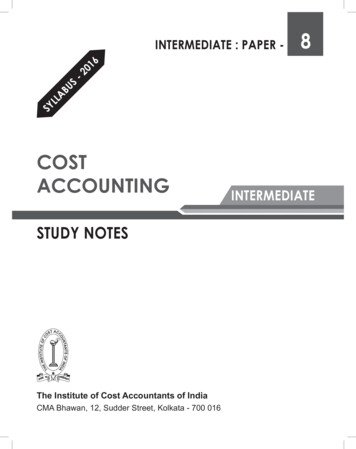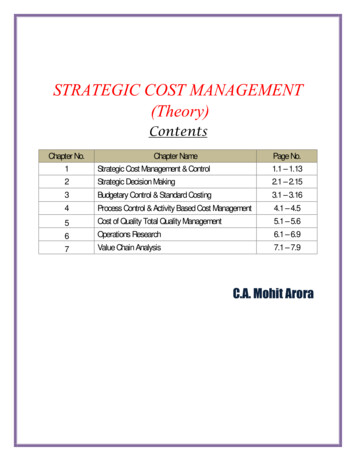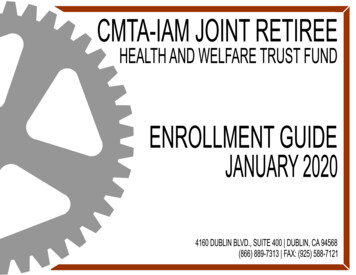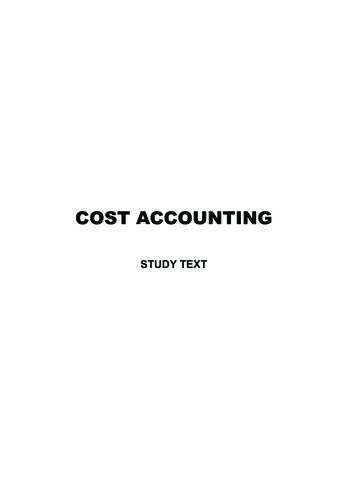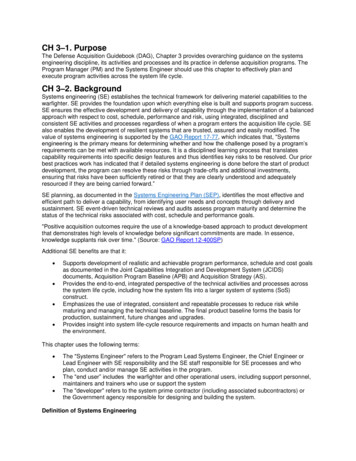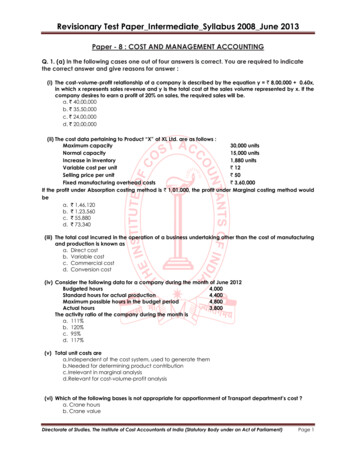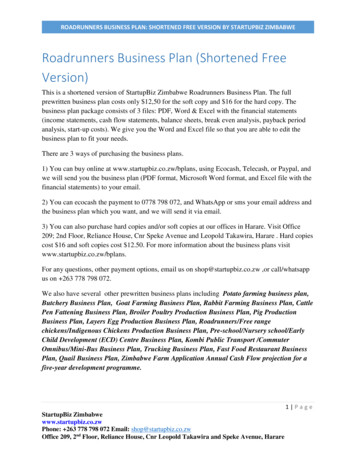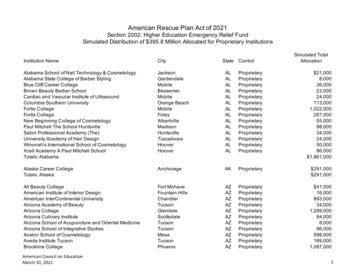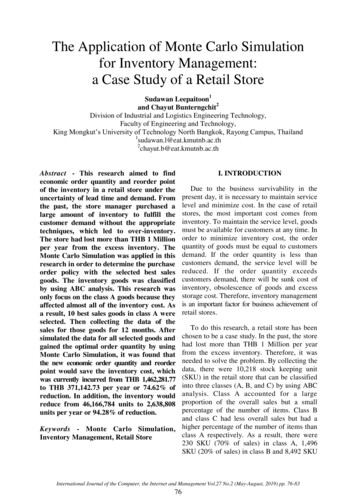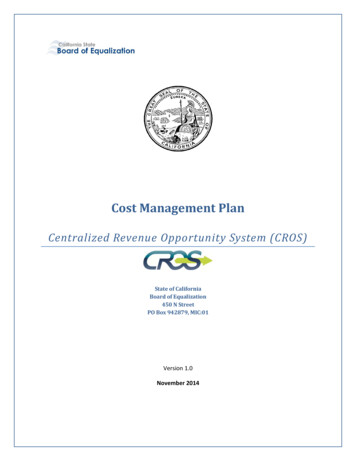
Transcription
Cost Management PlanCentralized Revenue Opportunity System (CROS)State of CaliforniaBoard of Equalization450 N StreetPO Box 942879, MIC:01Version 1.0November 2014
Centralized Revenue Opportunity System (CROS)Cost Management Plan ‐ Version 1.0Table of Contents1.Overview . 11.1Purpose . 11.2Assumptions . 11.3Scope . 11.3.1Project Cost Management . 11.3.2State Budgeting/Accounting . 21.42.Cost Planning . 52.1Establish Baseline . 52.2Adjust Baseline . 52.2.1Detail Changes . 72.2.2Research and Quantify . 72.2.3Write Proposed SPR/BCP . 72.2.4Review Proposed SPR/BCP . 72.2.5Approve Proposed SPR/BCP. 72.2.6Approved SPR/BCP . 72.2.7Adjust Baseline and Projections . 72.2.8Communicate New Baseline . 72.33.Roles and Responsibilities . 3Confirm/Adjust Current Year Spending Plan . 82.3.1Review Scope and Timeline . 92.3.2Review Spending Plan . 92.3.3Develop Proposed Spending Plan . 102.3.4Review and Approve Spending Plan . 102.3.5Update Spending Plan . 10Cost Management . 113.1Expenditure Tracking . 113.1.23.2Ongoing Expenditure Tracking . 14Cost Control and Changes . 173.2.1Reconciliation . 173.2.2Cost Variances . 17November 2014Page ii
Centralized Revenue Opportunity System (CROS)Cost Management Plan ‐ Version 1.03.34.Expenditure Reports and Metrics . 193.3.1Monthly Expenditure Report . 193.3.2Monthly status report‐ Department of Technology . 223.3.3CROS Dashboard . 253.3.4Special Project Report . 273.3.5Annual Cost Summary . 27State Budgeting and Accounting . 294.1Budget Planning . 294.2Project Concept Approval . 294.3SPR Development . 314.4Project Estimation Techniques . 314.5Budget Change Proposal (BCP) . 314.6Budget Hearings and Questions . 315.Referenced Documents . 326.Definitions of Acronyms and Terms . 33November 2014Page iii
Centralized Revenue Opportunity System (CROS)Cost Management Plan ‐ Version 1.01. Overview1.1PurposeThe purpose of cost management is to ensure project costs are planned based on project need, tracked,changed according to procedure and reported on a regular basis.This plan has two parts; the first part deals with project cost management and the second partaddresses the state budget process.This document will be reviewed and updated annually or as the result of continuing improvement in theproject’s cost management processes.1.2Assumptions 1.3The project will manage cost on a modified cash basis.We will not discuss how the baseline is created since the CROS Project has a baseline as definedin the approved FSR and subsequent approved SPRs.ScopeThe scope of the Cost Management Plan is the processes, roles, and tools used to plan and manageproject costs throughout the life of the project. The following cost management activities aredocumented in this plan:1.3.1 Project Cost Management Cost Planning – This function consists of the activities performed to identify and categorize costsbased on project need by fiscal year. The CROS cost management is guided by the CaliforniaDepartment of Technology Approved Feasibility Study Report (FSR) and the latest approved SpecialProject Report (SPR). The FSR and SPR outline the financial plan for the life of the project by fiscalyear. At the beginning of each fiscal year, the CROS Project will use the latest approved SPRfinancial plan as budget for the year, reconfirming projections and adjusting implementation of theprojections accordingly. There are three main activities to CROS Cost Planning: Establish baselineAdjust baselineCompare and assess baseline with BOE Budget Stakeholders Cost ManagementThis function defines how CROS will manage changes in project costs, record expenditures, andtrack planned to actual cost and expenditures. Expenditure Tracking – This function consists of the activities that track all expenditures ofthe CROS project including Personal Services and Operating Expense and Equipment. TheNovember 2014Page 1
Centralized Revenue Opportunity System (CROS)Cost Management Plan ‐ Version 1.0process tracks from the request for expenditure, research of the request, purchase, andtracking of the request through completion, the receipt and payment of the expenditure. Cost Control and Changes – This function defines how changes in the budget get definedand communicated and how unplanned expenditures and changes in costs are documented. Cost Reconciliation ‐ This process consists of the activities that reconcile the latest approvedSPR budget to actual expenditures on a monthly and yearly basis and monitor project to‐date costs. The process includes documenting budget assumptions made during the monthor for the upcoming month as well as lessons learned for adjustments to costs in the nextfiscal year. Reporting and Metrics ‐ This process consists of the activities that provide a variety ofreports and metrics for CROS Executive Management, Project Management and otherstakeholders. Cost Closeout: The annual cost summary and lessons learned.1.3.2 State Budgeting/AccountingThese processes define how CROS manages to the costs in the BCP directly related to the CROS Projectas planned in the SPR. Overhead costs, such as the facilities, complement are not formally tracked bythe project, but are tracked by BOE Budgets Section.November 2014Page 2
Centralized Revenue Opportunity System (CROS)Cost Management Plan ‐ Version 1.01.4Roles and ResponsibilitiesRoleResponsibilitiesProject Director Manage overall project within the budgetary constraints of the BCPand as outlined within the FSR and subsequent SPRs. Escalates issues with a cost impact greater than 250,000 to the CCB. Approves funding documents and represents CROS at the budgethearings; Reviews/approves or denies project expenditures at the weekly PMSync meeting.Business and TechnicalProject Managers Reviews project funding documents; Reviews/approves or denies project expenditures at the weekly PMSync meeting.Project Manager Approves Cost Management Plan; Responsible for the development of the project costs based on projectneed. Manages costs to the latest approved baseline. Reviews project funding documents; Reviews/approves or denies project expenditures at the weekly PMSync meeting.Cost Analyst Tracks project costs Reconciles project cost Assist in cost research and ensures cost transactions are adequatelydocumented.Project Administrator Business/TechnicalProject Managers; Identify funding needs and ensures all transactions have appropriatesupporting documentation to assist in the tracking of expenditures,including tracking of staff efforts and costs.CROS Team LeadsBOE Accounting OfficeNovember 2014Leads the cost management effort;Sponsors cost budgeting and tracking activities;Facilitates communication on fiscal status;Ensure the project cost tool is maintained and supportingdocumentation is maintained; Provides recommendations and statuses on the project budget andexpenditures. Ensures project funding and approval documents and expendituretracking and reconciliation in accordance with state processes; Coordinates the accounting, customer billing, and invoice approvalprocesses.Page 3
Centralized Revenue Opportunity System (CROS)Cost Management Plan ‐ Version 1.0RoleResponsibilitiesBOE Budget Office Coordinates the review and submission of budgetary documents,Budget Change Concepts, Budget Change Proposals to Department ofFinance; Coordinates responses to questions from the DOF and assists with thedistribution of the final Governor’s Budget.Change Control Board(CCB) Makes decisions on issues that impact cost, schedule or resources. Cost impacts of greater than 250,000 are escalated to the CCB.November 2014Page 4
Centralized Revenue Opportunity System (CROS)Cost Management Plan ‐ Version 1.02. Cost Planning2.1Establish BaselineThe approved FSR and all approved SPRs contain the project approach and resource needs. Theproject’s baseline costs are derived from the project needs as defined in these documents. Theapproved FSR contains the project’s baseline cost projections for each cost category, by fiscal year forthe entire life of the project. Since the FSR and baseline EAWs has already been developed andapproved, this plan will not discuss this process.2.2Adjust BaselineWhen project has to submit an SPR to CalTech, it usually means there has been a major deviation fromthe project’s scope or schedule or costs. The SPR process will trigger an adjustment to the cost baseline.CROS uses a Change Control Board to validate and approve internal project requests for changes inresources greater than 250,000. Changes less than 250,000 are reviewed and approved by the PMSync.Adjust BaselineReceive ApprovedChange ControlDocumentCal TechAgencyManagementTeamTeam LeadsSME/OtherOrganizationsCost AnalystPMOPhase8Communicate NewBaseline1Detail changes2Research & Quantify3Write ProposedSPR/BCP7Adjust Baseline &Projections1.1Provide Input tochanges4Review5Approve ProposedSPR/BCP6Approved SPRFigure 1 ‐ Adjust BaselineNovember 2014Page 5
Centralized Revenue Opportunity System (CROS)Cost Management Plan ‐ Version 1.0Process StepParticipants 1 ‐ Detail Changes 1.1 ‐ Provide Inputto Changes Cost Analyst Subject MatterExperts OtherOrganizations 2 – Research andQuantify Co
The purpose of cost management is to ensure project costs are planned based on project need, tracked, changed according to procedure and reported on a regular basis. This plan has two parts; the first part deals with project cost management and the second part addresses the state budget process.
